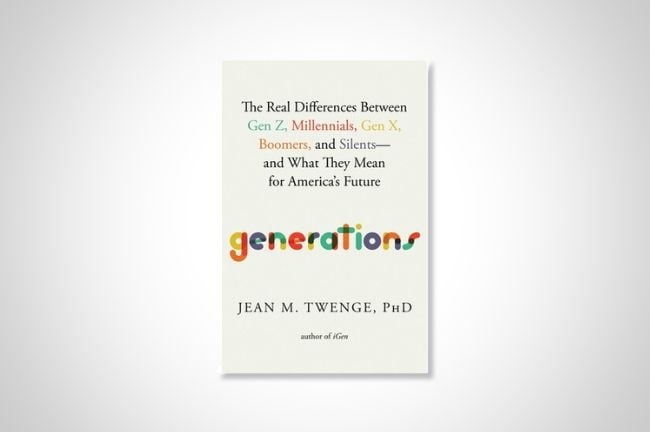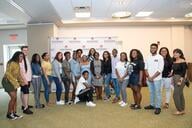You have /5 articles left.
Sign up for a free account or log in.

Simon & Schuster
Generations: The Real Differences between Gen Z, Millennials, Gen X, Boomers, and Silents—and What They Mean for America’s Future by Jean M. Twenge
Published in April 2023
As someone trained as a demographer, I’m hardwired to be skeptical of generational explanations for social trends. This skepticism is reflected in a recent statement (May 2023) by Pew Research, describing their current stance on generational research.
Generational research has become a crowded arena. The field has been flooded with content that’s often sold as research but is more like clickbait or marketing mythology. There’s also been a growing chorus of criticism about generational research and generational labels in particular.
With these considerations in mind, our audiences should not expect to see a lot of new research coming out of Pew Research Center that uses the generational lens. We’ll only talk about generations when it adds value, advances important national debates and highlights meaningful societal trends.
Pew’s decision to largely repudiate generations as an analytical lens would seemingly bode poorly for Jean M. Twenge’s new book, Generations. The thing is, Generations is fantastic.
Twenge, a professor of psychology at San Diego State University, has written a data-driven and nuanced book about the impact of generations on U.S. social and economic life. This book just might be the best counterargument to Pew abandoning a generational research lens.
Our work in higher education is all about investing in the generations that have and will come after our own. Our traditional residential students are mostly Gen Z (born 1995 to 2012—ages 11 to 28), and a large proportion of our online adult learner students are millennials (born 1980 to 1994—ages 29 to 43). The education, skills, credentials and degrees that our Gen Z and millennial students earn today will reap individual and societywide benefits years in the future.
Future generations will benefit most from the basic research and foundational knowledge creation at the heart of research-intensive universities. The discoveries made today in labs, studios, and centers of colleges will benefit our Gen Z and Alpha/Polar (born 2013 to 2029) children and grandchildren.
Among the most critical challenges colleges and universities face is developing, nurturing, recruiting and retaining the next generation of faculty and staff. As a member of Generation X (born 1965 to 1979—ages 44 to 58), I’m highly aware that it is the millennials and Gen Zs who are poised to take over the work of higher education.
It is in thinking about how we turn over academia to the next generations that reading Generations is so valuable for academics.
What will the next generations of faculty and staff look like?
Reading Generations is a reminder that tomorrow’s postsecondary workforce will be dramatically more diverse than today’s. Nearly half of Gen Z are nonwhite, compared to just over a third of Generation X and fewer than a quarter of Boomers (born 1946 to 1964—ages 59 to 77).
To attract and retain the best and the brightest of Gen Z to work at our colleges and universities, our institutions must be welcoming places for transgender, nonbinary and LGBTQ academics.
Colleges and universities depend on today’s young children to become tomorrow’s enrolled (and tuition-paying) students. Demographically, this will be a challenging business model to build our academic budgets, as Gen Z’s fertility is likely to resemble today’s South Korea. Universities would be wise to invest in quality childcare options to attract and retain millennial and Gen Z faculty and staff who are having babies. Offering on-campus doggy daycare options and pet insurance is also a wise university talent acquisition move.
Much of Generations is taken up with investigating the underlying causes of the Gen Z mental health crisis. Social media and smartphones get most of the blame. I’m forever grateful for my analog childhood. The mental health of Gen Z will need to be front and center as we design our institutions for the next generation of faculty and staff.
Today, higher education leadership requires that presidents, provosts and deans think about our colleges and universities as places of work. Tomorrow’s higher education workforce will not magically show up on our campuses. And those who decide to go into academia might decide to leave.
Reading books like Generations can help us design the colleges and universities that Gen Z will want to join as tomorrow’s faculty and staff.
Gen Z–friendly institutional cultures will not be built overnight. Now seems like the time to start.
What are you reading?




